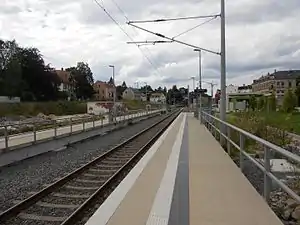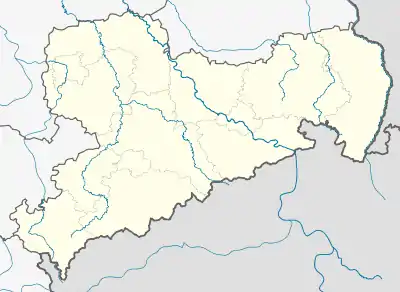Meerane station
Meerane station is a railway station on the Glauchau–Gößnitz railway. Meerane station is the only station in the town of Meerane in the German state of Saxony. The station is now served by Regionalbahn and Regional-Express services on the Mid-Germany Connection (Mitte-Deutschland-Verbindung). Freight transport facilities no longer exist.
| Through station | |||||||||||||||||||||
 Meerane station (August 2013) | |||||||||||||||||||||
| Location | Am Bahnhof 5, Meerane, Saxony Germany | ||||||||||||||||||||
| Coordinates | 50°51′03″N 12°27′27″E | ||||||||||||||||||||
| Owned by | Deutsche Bahn | ||||||||||||||||||||
| Operated by | DB Station&Service | ||||||||||||||||||||
| Line(s) | Glauchau–Gößnitz (km 6.7) | ||||||||||||||||||||
| Platforms | 2 | ||||||||||||||||||||
| Other information | |||||||||||||||||||||
| Station code | 4022[1] | ||||||||||||||||||||
| DS100 code | DMA[2] | ||||||||||||||||||||
| IBNR | 8012323 | ||||||||||||||||||||
| Category | 6[1] | ||||||||||||||||||||
| Website | www.bahnhof.de | ||||||||||||||||||||
| History | |||||||||||||||||||||
| Opened | 15 November 1858 | ||||||||||||||||||||
| Services | |||||||||||||||||||||
| |||||||||||||||||||||
| Location | |||||||||||||||||||||
 Meerane Location within Saxony  Meerane Location within Germany  Meerane Location within Europe | |||||||||||||||||||||
History
Meerane station has existed since the opening of the line on 15 November 1858.
The station building was completely rebuilt in 1940/41. The historicised facade decoration was replaced by smooth plaster surfaces.
Deutsche Reichsbahn's electrification program reached Meerane station in May 1984. Only a single track was electrified as an economy.[3]
After German reunification in 1990, Meerane station was also stop for express, D and InterRegio trains for a short time. In the 1993/94 timetable, the long-distance train pairs, D 2058/59 (Chemnitz–Erfurt/Weimar–Chemnitz) and IR 2550/51 (Chemnitz–Aachen and return) stopped in Meerane.[4] There was, however, a sharp drop in freight traffic. After 2000, the equipment for handling freight and the tracks that were no longer needed were closed and the tracks were dismantled.
After the InterRegio connections were discontinued, only Regionalbahn and Regional-Express services operated by DB Regio stopped at Meerane. It was now connected to the west (Erfurt, Jena, Gera), north (Altenburg, Leipzig) and east (Glauchau, Chemnitz, Dresden).
In 2011, Meerane station was fundamentally rebuilt and a modern public transport system was created during the renewal of the Glauchau–Gößnitz railway. The line was completely blockaded for nine months. A "house" platform (next to the station building) and an island platform were built and access to the island platform is protected by a passenger security system.[5] The historic entrance building, which was vacated, was demolished despite intense discussions regarding the preservation of its portico. The entrance building was not a protected monument because of its reconstruction in 1940/41.[6] The through track was built to accommodate 140 km/h and tilting technology during the course of the track upgrade.[7] The control of the signals and points since then have been operated through a local electronic interlocking, which is controlled from the Leipzig operations centre.
Scheduled services recommenced on 11 December 2011.[8]
Description
The historic entrance building was built in the 19th century in a typical, historicist style. Similar station buildings with identical facade elements were built in Saxony, among others in Freiberg, Hohenstein-Ernstthal and Zittau. After a reconstruction carried out in 1940/41, the character of the building changed completely. It was adapted to the architecture of the time. All the historical facade elements were removed. The entrance area was overlaid with a so-called portico, which was later decorated with a wall painting (two workers, a weaver and a mechanical engineer). This was characteristic of the station in the 1970s and shaped its appearance for travellers.[9] Typical of the Nazi period was a large heraldic eagle on the front sides of the building, which was removed in 1945. Its former location could easily be seen from the colour and form of the much darker plaster until the building was demolished in 2010.
The historic entrance building was demolished in 2011 to allow barrier-free access and replaced by a simple functional building with a ticket machine, store for travel necessities, toilets and bicycle parking. Two stops were set up for regional bus services. There are many parking spaces for cars.
 Meerane station (1858)
Meerane station (1858) Meerane station (1908)
Meerane station (1908) Meerane station (2008)
Meerane station (2008)
After reconstruction in 2011, Meerane station has two platform platforms, each with a platform length of 170 m.
Transport connections
Regional services
In the 2016 timetable, Meerane station is served by a regional express line (RE 1), running from Göttingen through Erfurt Hbf, Gera Hbf and Meerane to Glauchau (Sachs), and a short regional service (RB 37) running from Gößnitz to Glauchau. Both lines run every two hours, so there is one scheduled departure per hour and direction.
Bus services
| Wikimedia Commons has media related to Meerane station. |
Several bus routes, which are integrated into the Verkehrsverbund Mitachsen stop in the station forecourt. In addition to routes within Meerane, the following bus routes run:
- route 133 to Zwickau
- route 105 to Glauchau
- routes 106 and 119 to Crimmitschau
- route 133 to Gößnitz
References
- "Stationspreisliste 2021" [Station price list 2021] (PDF) (in German). DB Station&Service. 16 November 2020. Retrieved 3 December 2020.
- Eisenbahnatlas Deutschland (German railway atlas) (2009/2010 ed.). Schweers + Wall. 2009. ISBN 978-3-89494-139-0.
- Chronik der Standt Meerane (in German). AG Ortschronik, 1970-1989. p. 185.
- Saxon regional timetable 1993/94, with effect from 23 May 1993
- "Deutsche Bahn nimmt erneuerte Streckenabschnitte in Westsachsen in Betrieb" (Press release) (in German). Deutsche Bahn AG. 12 December 2011.
- "Aktuelles, Bahnhof Meerane" (in German). www.meerane.de. 18 April 2008. Archived from the original on 7 April 2016. Retrieved 14 January 2011.
- "Bahn investiert 20 Millionen Euro zwischen Glauchau und Gößnitz". Freie Presse (in German). 28 February 2011. Retrieved 14 January 2011.
- "Bahnhof Meerane / Neue Verknüpfungsstelle: Züge rollen wieder durch Meerane" (in German). www.meerane.de. 12 December 2011. Archived from the original on 30 December 2013. Retrieved 14 January 2011.
- "Wandbild Bahnhof Meerane" (in German). www.fotocommunity.de. 13 April 2011. Retrieved 14 January 2011.